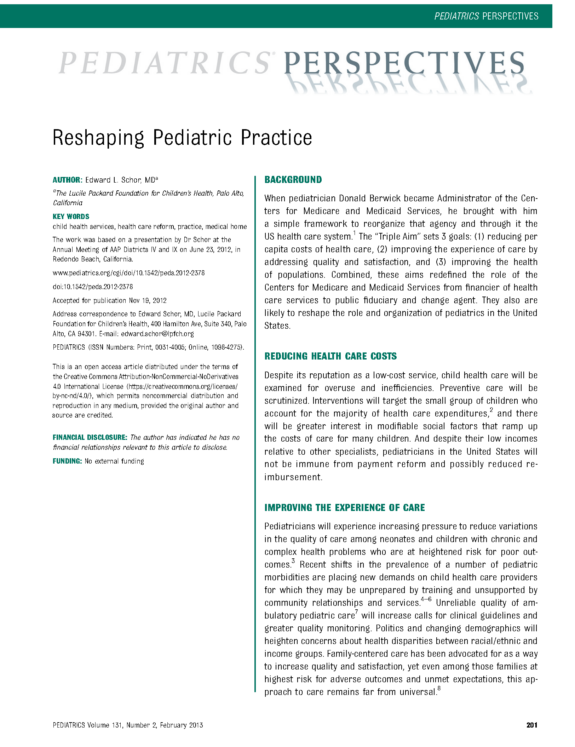Aiming for Change: Achieving Triple Aim Goals in Pediatricians’ Practices
Pediatricians, with their politically popular patient base, might feel insulated from the cost-cutting and accountability initiatives that are washing over health care providers like a tidal wave.
They shouldn’t, Dr. Edward Schor argues in a recent article in the journal Pediatrics.
Pediatricians, like other specialists, are facing new pressures to account for the quality and cost of care they provide to their small charges. That’s especially true for physicians treating chronically ill children, whose increasingly complex care is contributing to rising medical costs.
Dr. Schor, a pediatrician and senior vice president for programs and partnerships at the Lucile Packard Foundation for Children’s Health, highlights six ways health providers can help transform the care they provide to children and their families. The goal, he writes, is to achieve the Institute for Healthcare Improvement’s “Triple Aim” framework: reduce health care costs, improve patients’ experiences of care, and improve the health of populations.
- Family Centered Medical Homes: Child health providers are being asked to create “medical homes” that better coordinate their patients’ care, but incentives for them to do so remain lacking.
- Practice Redesign: Advanced access appointment systems and telehealth initiatives are among pediatric practice transformations that are improving patient satisfaction.
- Care Plans and Care Planning: Physicians can work with patients to create individualized “accountable care plans” that address acute, preventive and chronic care, and spells out who is responsible for each part of the care plan.
- Supporting Self-Management: Pediatricians can better involve patients and caregivers by emphasizing problem-solving approaches and self-monitoring.
- Organized Health Care Systems: Because participation in large, integrated health networks can improve quality and control costs, increasingly, insurers and other payers are offering incentives for pediatricians to join these networks.
- Sharing Resources: Large health networks aren’t the only option for pediatricians who want to benefit from partnerships while retaining their autonomy. Community-based systems of care coordination, after-hours call centers and other initiatives involve pooling resources from local health providers for mutual benefit.

